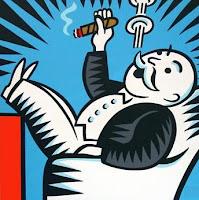 "Grief shared is half grief; Joy shared is double joy."
"Grief shared is half grief; Joy shared is double joy."
Honduran Proverb
The Honduran Proverb "Grief shared is half grief; Joy shared is double joy." is widely accepted as a modern truism. It could be described as a kind of emotional socialism, in which sharing is the ultimate answer to our hopes and fears. But why keep such a powerful formula contained within the matters of the heart? Why not use it as a new economic theory that could rival those of Karl Marx and John Maynard Keynes. Let's try it...
"Poverty shared is half poverty; Wealth shared is double wealth."
"Work shared is half work; Leisure shared is double leisure."
"Liability shared is half liability; Asset shared is double asset."
"Cost shared is half cost; Profit shared is double profit."
You may say that this is nothing new, it's just another description of socialism in it's simplest form. Perhaps, or perhaps it's a new level of simplicity that is the key for understanding the most propagandized topic in American history. The level of disinformation around the basic comparisons of economic theories is largely due to the fact that it has been on the top ten list of national security threats for over a century. We have been trained to fuse the word "socialism" with "The Soviet Union" and with "Evil" so that they are all one and the same. All these decades after the madness that was McCarthyism one can still hardly bring up socialist theories without being told that they "wouldn't want to live in Russia."
Whether one would like to live in Russia, or Cuba, or France is beside the point, no nation is a true representation of socialism. The Soviet Union was no more an example of socialism than the United States is an example of Capitalism, neither of these theories have been allowed to follow their true course. Capitalism may be the overall economic system in the United States and much of the world but there is nothing in the basic theory that suggests unfettered corporate rule. But the economic divide that capitalism helps to create and/or maintain inevitably leads to exploitation and corruption. In fact, capitalism has always been a device to continue the aristocracies of the Roman and British empires into modern times wearing the mask of Democracy.
"The market has spoken" is a popular phrase that suggests that democracy extends beyond our ballots to our wallets. But this is not democracy, on the contrary, it's how the aristocracy rules. In the election booth we are all equal, one person, one vote. But in the market place, which we are told has no limits to it's greedy reach, some people have millions of votes and some have none. Some people can buy success in a court room or an election and others cannot pay their rent or buy their groceries. The chance that a poor person who speaks the truth can win an election over a wealthy person who tells people whatever they want to hear is Lucky Lotto low, and the odds that they could change anything of any significance is still lower.
Exactly what about capitalism would Jesus agree with? Some people deserve more? The poor should pull themselves up by their own bootstraps? When did Jesus get all "Tough love" on us? And Jesus said unto the masses: "Go get a job losers, don't expect me to share any of my hard earned fish and wine with a bunch of mooches." Think about it "Poverty shared is half poverty; Wealth shared is double wealth." Would Jesus agree with this statement? If not, why not? I think the answer lies somewhere between the "Eye of the needle" and "The meek shall inherit the earth." What does it profit a man to gain the whole world but lose his soul? A six figure income? A private estate? Lear jet? hmmmm, what would Jesus trade his soul for?




No comments:
Post a Comment